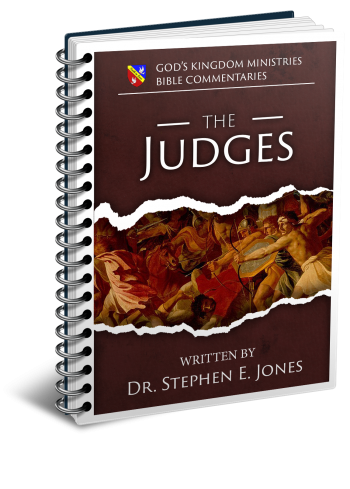Latest Posts
View the latest posts in an easy-to-read list format, with filtering options.

Two books in one. The first book is how the Judges themselves are named prophetically to give a message of Sonship. Book 2 is a commentary on the last 5 chapters of the book of Judges, presenting examples of how Israel was lawless after the death of Joshua.
Category - Bible Commentaries

After two losses in battle, the Israelites finally repented for their own sin and then won the victory over the tribe of Benjamin. Judges 20:26 says,
26 Then all the sons of Israel and all the people went up and came to Bethel and wept; thus they remained there before the Lord and fasted that day until evening. And they offered burnt offerings and peace offerings before the Lord.
This day of fasting was not the Day of Atonement, since we learn later that four months after the battle (Judges 20:47) there was a feast day at Shiloh where the women danced (Judges 21:19). It is likely, then, that the fast occurred around the time of Pentecost and that the feast day of dancing and rejoicing was Tabernacles.
This story also applies to the Church today, because they fasted at Bethel, “house of God” about the time of Pentecost. Further, we read in Judges 20:27, 28,
27 And the sons of Israel inquired of the Lord (for the ark of the covenant of God was there in those days, 28 and Phinehas the son of Eleazar, Aaron’s son, stood before it to minister in those days), saying, “Shall I yet again go out to battle against the sons of my brother Benjamin, or shall I cease?” And the Lord said, “Go up, for tomorrow I will deliver them into your hand.”
Take note that the Ark was not in Shiloh, where it had been placed originally (Joshua 18:1). We find also in later years that often the Ark was in places other than in the original tabernacle. For example, David took the Ark to his house in Jerusalem, but the tabernacle of Moses continued to function as the main center of worship in Kirjeath-jearim (2 Chron. 1:4).
In the latter part of the reign of David, we find the tabernacle in Gibeon (1 Chron. 21:29).
So in the time of this civil war, the Ark was in Bethel. This was not long after the death of Joshua, because we see that Phinehas, the son of Eleazar, was still the high priest. Phinehas had been chosen to hold the high priest’s office during the time of Moses himself (Num. 25:11-13). Since he was already an adult at that time, this civil war probably took place between the time of Joshua’s death and Israel’s first captivity to the king of Mesopotamia (Judges 3:8).
Also, this civil war makes no mention of any Judge, so it almost certainly took place before the time of Othniel, the first Judge. After Phinehas, there would be another four generations until Eli became the high priest.
Aaron had four sons. The first two, Nadab and Abihu, died in their conspiracy against Moses. The other two were Eleazar and Ithamar (Exodus 6:23). Eleazar was given the priesthood after the death of Aaron, and his son Phinehas succeeded him. That line continued unbroken until the time of Eli, who was actually the first high priest of the line of Ithamar. Josephus (Antiquities of the Jews, V, xi, 5) tells us,
“Now Eli was the first of the family of Ithamar, the other son of Aaron that had the government; for the family of Eleazar officiated as high priest at first…”
The priesthood of Phinehas, said to be “an everlasting priesthood” (Num. 25:13, KJV), lasted just four generations, according to Josephus: Phinehas, Abiezer, Bukki, and Ozi. From this we know that the Hebrew word olam does not mean “everlasting” (KJV) or even “perpetual” (NASB). It refers to an uncertain or indefinite amount of time. The root word alam means “to hide.” Hence, olam literally means a hidden or unknown period of time.
Something unrecorded in Scripture apparently happened with Ozi, the last high priest of the line of Phinehas. Whatever happened, it was serious enough for God to replace his priestly dynasty with Eli, who was of Ithamar.
Furthermore, God put the Israelites into the Philistine captivity shortly after Ozi died, which meant that Eli officiated during the entire 40-year captivity.
Yet Eli too was disqualified through corruption, perhaps for the same reason that his predecessor was replaced. Eli’s line lasted another four generations until Abiathar was replaced by Zadok.
We may conclude, then, that the civil war with Benjamin took place about two centuries before the death of Samson (Judges 16:31). Samson’s burial is the chronological end of the book of Judges.
The third battle resulted in an overwhelming victory for the repentant Israelites. In that third battle, 25,100 men of Benjamin were killed (Judges 20:35). This included 18,000 killed in the main battle, and another 7,000 as they tried to flee (Judges 20:44, 45).
The town of Gibeah was also then destroyed (Judges 20:37), including, no doubt, the lawless gang that had ruled the town. We are not told the fate of the man who had shown hospitality to the Levite. However, we are told that “they also set on fire all the cities which they found” (Judges 20:48), devastating the entire tribe of Benjamin, including women, children, and even cattle. In other words, the tribe was judged as if they had been idolatrous Canaanites.
Judges 20:46 tells us that a total of 25,000 men of Benjamin were killed that day, which is probably rounded off from the earlier figure of 25,100. All of the women and children were killed, and only 600 men survived (Judges 20:47). These survivors set up a fortress at the rock of Rimmon, where they lived four months in a virtual state of siege.
Phinehas, the high priest during this civil war, had told the Israelites that God would give them victory in the third battle. But there was no (recorded) instruction for them to destroy the entire tribe of Benjamin. After a few months, the Israelites had cooled down enough to assess what they had done. God had first judged them in two battles, wherein 40,000 Israelites died in battle. In the third battle, God judged Benjamin, killing 25,000 men of war, but if we include the women and children in the list of casualties, the figure was certainly far higher.
The Israelites had also made a vow, as we read in Judges 21:1-3,
1 Now the men of Israel had sworn in Mizpah, saying, “None of us shall give his daughter to Benjamin in marriage.” 2 So the people came to Bethel and sat there before God until evening, and lifted up their voices and wept bitterly. 3 They said, “Why, O Lord, God of Israel, has this come about in Israel, so that one tribe should be missing in Israel?”
Judges 21:5 says further,
5 Then the sons of Israel said, “Who is there among all the tribes of Israel who did not come up in the assembly of the Lord?” For they had taken a great oath concerning him who did not come up to the Lord at Mizpah, saying, “He shall surely be put to death.”
Apparently, the people had taken two oaths. The first was that anyone who did not join them at Mizpah to fight the tribe of Benjamin would be put to death. Once they had gathered at Mizpah, they all took “a great oath” not to intermarry with the tribe of Benjamin. Hence, nearly everyone came and took the oath, but after the war, they regretted doing this. Judges 21:6, 7 says,
6 And the sons of Israel were sorry for their brother Benjamin and said, “One tribe is cut off from Israel today. 7 What shall we do for wives for those who are left, since we have sworn by the Lord not to give them any of our daughters in marriage?”
The Israelites then discovered that the city of Jabesh-Gilead (in the east half of Manasseh) had not sent its men of war to do battle with Benjamin. So the Israelites fulfilled their first oath by destroying the city. They spared 400 young girls and brought them to Shiloh to an unspecified feast of Israel, where they were to dance before the Lord. Tabernacles is a time of rejoicing and dance, so it is likely that this was the feast in the story.
The Israelites then told the men of Benjamin to kidnap the 400 girls, since they were not allowed to actually give them in marriage to the men of Benjamin. In this way they were able to restore the tribe of Benjamin without technically violating their oath.
Apparently, their oath-keeping did not impress Samuel, because he concluded in Judges 21:25,
25 In those days there was no king in Israel; everyone did what was right in his own eyes.
Samuel’s ironic conclusion shows the tragedy of lawlessness when men think that their own conscience is sufficient to guide them. Conscience ought not to be a substitute for the law of God but serve as an aid to interpreting it by the leading of the Holy Spirit.
A few generations later, Saul was born in Gibeah of Benjamin, and he was descended from one of those 600 Benjamites and from one of those 400 girls taken from Jabesh-gilead.
Jabesh-gilead was rebuilt and repopulated, and two centuries later, Saul saved the city from Nahash the Ammonite (1 Sam. 11:1). Saul’s leadership distinguished him and proved his worthiness to become Israel’s first king.
When Saul died forty years later, the Philistines beheaded him and his sons and hanged their bodies on a wall (1 Sam. 31:8-10). But the men of Jabesh-gilead remembered his valor in delivering them, so they sent “valiant men” to recover their bodies, burying them honorably outside of their own city of Jabesh (1 Sam. 31:12, 13).